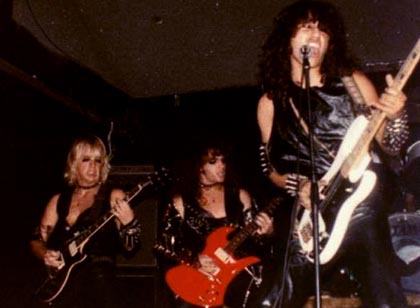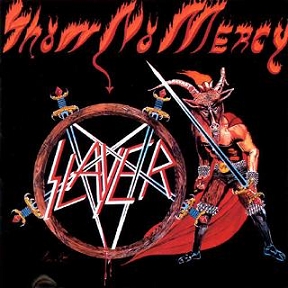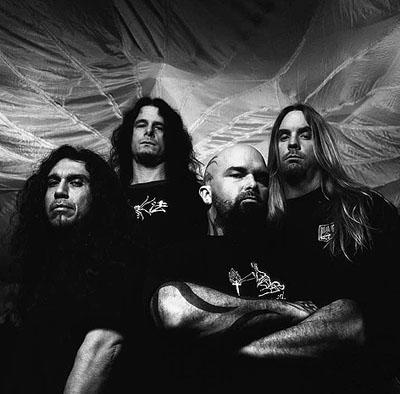One of the most famous thrash bands came together because of a pizza delivery.
 In 1981 bassist/vocalist Tom Araya and guitarists Jeff Hanneman and Kerry King were playing in a band called Quits when future drummer Dave Lombardo met King while delivering a pizza. The rest is thrash metal history.
In 1981 bassist/vocalist Tom Araya and guitarists Jeff Hanneman and Kerry King were playing in a band called Quits when future drummer Dave Lombardo met King while delivering a pizza. The rest is thrash metal history.
The band began playing Judas Priest and Iron Maiden covers live and were discovered by Metal Blade Records founder Brian Slagel, who signed the band to a record contract.

In 1983 Slayer would record and release their debut album Show No Mercy on Metal Blade Records. Metal Blade did not pay for the record to be made so Araya and King had to use their own money to pay for the recording. Show No Mercy quickly became the best selling record in Metal Blade history. The band went on their first tour in 1984 playing with future thrash legends Venom and Exodus.
In 1984 the band went into the recording studio once again. This time to record an EP entitled Haunting the Chapel. Following the release of the EP, guitarist King decided to join Megadeth and played a few shows with the band. After returning to Slayer, a decades long feud would develop between King and Megadeth founder Dave Mustaine.
By 1985 Slayer had recorded their second studio album. This time, however, Metal Blade agreed to finance the release. The album, entitled Hell Awaits, is often cited as Slayer's most progressive effort and became well-known for the controversy that it generated. The title track featured a backmasked demonic sounding voice repeating "Join us" and the album artwork showed demons ripping people up as they were damned to hell.
Following Hell Awaits, Slayer would be signed to major hip-hop label Def Jam Records in 1986. Their first album on the new label, Reign In Blood, was considered an instant thrash classic and would be certified Gold for sales of over 500,000 units. Much like Hell Awaits, Reign In Blood generated lots of controversy before and after it's release. Def Jam distributor Columbia Records refused to release the album due to it's graphic cover artwork and the song "Angel of Death" was criticized by many people who were offended due to it's perceived sympathy for Nazi physician Josef Mengele. Regardless of the controversy, the album managed to reach number 94 on the Billboard 200.

After the 28 minute assault that was Reign In Blood, Slayer decided to release a slower, longer album as it's follow-up. 1988's South of Heaven initially received mixed reviews, with guitarist King stating, "that album was my most lackluster performance," and Rolling Stone Magazine calling it, "genuinely offensive Satanic drivel." Despite the reviews the album debuted at number 57 on the Billboard 200 and is today considered a classic Slayer record with future live staples "South of Heaven" and "Mandatory Suicide" included on it.
In 1990 the band decided to return to playing fast songs while keeping some of the more melodic qualities from their previous effort. The resulting album was Seasons in the Abyss. Seasons debuted at number 44 on the Billboard 200 and was certified Gold within two years. The album spawned Slayer's first hit single and music video in the title track. The band joined Megadeth, Anthrax, and Testament in 1991 on the Clash of the Titans Tour. In the middle of the tour drummer Dave Lombardo quit the band.
 Lombardo's replacement, Forbidden drummer Paul Bostaph, would appear on the bands next three studio albums: 1994's Divine Intervention, 1998's Diabolus in Musica, and 2001's God Hates Us All. God Hates Us All would once again see Slayer at the center of controversy. The album cover was changed in North America due to the original depicting a bloody and burned Bible with the words Slayer across the front and Bible verses crossed out in the liner notes. The album sold poorly, however, due to it's unfortunate release date: September 11, 2001.
Lombardo's replacement, Forbidden drummer Paul Bostaph, would appear on the bands next three studio albums: 1994's Divine Intervention, 1998's Diabolus in Musica, and 2001's God Hates Us All. God Hates Us All would once again see Slayer at the center of controversy. The album cover was changed in North America due to the original depicting a bloody and burned Bible with the words Slayer across the front and Bible verses crossed out in the liner notes. The album sold poorly, however, due to it's unfortunate release date: September 11, 2001.
In 2002 drummer Dave Lombardo rejoined the band and the original line-up has appeared on the band's last two studio releases Christ Illusion and World Painted Blood. Slayer is often cited as one of the most influential thrash metal bands of all time and are considered among the "Big Four" of American thrash metal.
 In 1981 bassist/vocalist Tom Araya and guitarists Jeff Hanneman and Kerry King were playing in a band called Quits when future drummer Dave Lombardo met King while delivering a pizza. The rest is thrash metal history.
In 1981 bassist/vocalist Tom Araya and guitarists Jeff Hanneman and Kerry King were playing in a band called Quits when future drummer Dave Lombardo met King while delivering a pizza. The rest is thrash metal history.The band began playing Judas Priest and Iron Maiden covers live and were discovered by Metal Blade Records founder Brian Slagel, who signed the band to a record contract.

In 1983 Slayer would record and release their debut album Show No Mercy on Metal Blade Records. Metal Blade did not pay for the record to be made so Araya and King had to use their own money to pay for the recording. Show No Mercy quickly became the best selling record in Metal Blade history. The band went on their first tour in 1984 playing with future thrash legends Venom and Exodus.
In 1984 the band went into the recording studio once again. This time to record an EP entitled Haunting the Chapel. Following the release of the EP, guitarist King decided to join Megadeth and played a few shows with the band. After returning to Slayer, a decades long feud would develop between King and Megadeth founder Dave Mustaine.
By 1985 Slayer had recorded their second studio album. This time, however, Metal Blade agreed to finance the release. The album, entitled Hell Awaits, is often cited as Slayer's most progressive effort and became well-known for the controversy that it generated. The title track featured a backmasked demonic sounding voice repeating "Join us" and the album artwork showed demons ripping people up as they were damned to hell.
Following Hell Awaits, Slayer would be signed to major hip-hop label Def Jam Records in 1986. Their first album on the new label, Reign In Blood, was considered an instant thrash classic and would be certified Gold for sales of over 500,000 units. Much like Hell Awaits, Reign In Blood generated lots of controversy before and after it's release. Def Jam distributor Columbia Records refused to release the album due to it's graphic cover artwork and the song "Angel of Death" was criticized by many people who were offended due to it's perceived sympathy for Nazi physician Josef Mengele. Regardless of the controversy, the album managed to reach number 94 on the Billboard 200.

After the 28 minute assault that was Reign In Blood, Slayer decided to release a slower, longer album as it's follow-up. 1988's South of Heaven initially received mixed reviews, with guitarist King stating, "that album was my most lackluster performance," and Rolling Stone Magazine calling it, "genuinely offensive Satanic drivel." Despite the reviews the album debuted at number 57 on the Billboard 200 and is today considered a classic Slayer record with future live staples "South of Heaven" and "Mandatory Suicide" included on it.
In 1990 the band decided to return to playing fast songs while keeping some of the more melodic qualities from their previous effort. The resulting album was Seasons in the Abyss. Seasons debuted at number 44 on the Billboard 200 and was certified Gold within two years. The album spawned Slayer's first hit single and music video in the title track. The band joined Megadeth, Anthrax, and Testament in 1991 on the Clash of the Titans Tour. In the middle of the tour drummer Dave Lombardo quit the band.
 Lombardo's replacement, Forbidden drummer Paul Bostaph, would appear on the bands next three studio albums: 1994's Divine Intervention, 1998's Diabolus in Musica, and 2001's God Hates Us All. God Hates Us All would once again see Slayer at the center of controversy. The album cover was changed in North America due to the original depicting a bloody and burned Bible with the words Slayer across the front and Bible verses crossed out in the liner notes. The album sold poorly, however, due to it's unfortunate release date: September 11, 2001.
Lombardo's replacement, Forbidden drummer Paul Bostaph, would appear on the bands next three studio albums: 1994's Divine Intervention, 1998's Diabolus in Musica, and 2001's God Hates Us All. God Hates Us All would once again see Slayer at the center of controversy. The album cover was changed in North America due to the original depicting a bloody and burned Bible with the words Slayer across the front and Bible verses crossed out in the liner notes. The album sold poorly, however, due to it's unfortunate release date: September 11, 2001.In 2002 drummer Dave Lombardo rejoined the band and the original line-up has appeared on the band's last two studio releases Christ Illusion and World Painted Blood. Slayer is often cited as one of the most influential thrash metal bands of all time and are considered among the "Big Four" of American thrash metal.
No comments:
Post a Comment